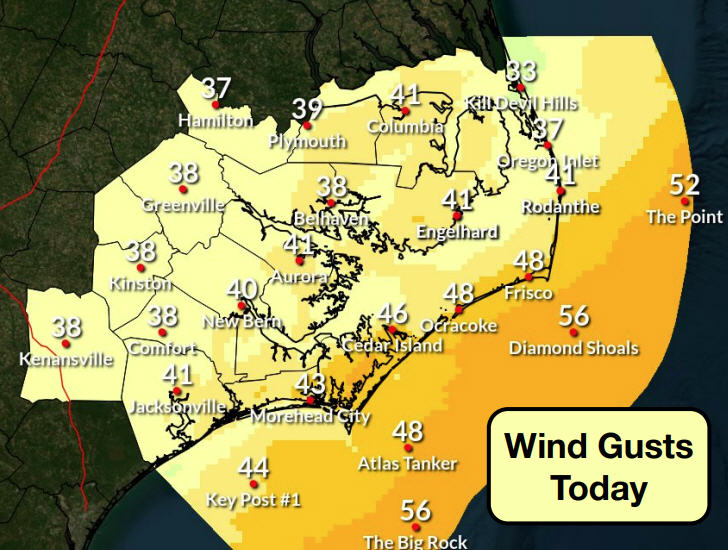Legislative Update: Bill aims at opportunities for Oregon Inlet Lifesaving Station
While the North Carolina House of Representatives wrestled with its version of the budget this week, the N.C. Senate continued moving other bills forward, amending many along the way.
A bill seemed designed to quasi-privatize some public properties had been dormant until it came alive on May 20 when it was amended and moved forward in the process.
Senate Bill 486, sponsored by Sen. Bill Cook, R-Beaufort, and titled N.C. Trail Expansion/Economic Corridors, includes investigating leasing portions of several state-owned properties, including the North Carolina Zoo, to developers.
The proposed bill also instructs the Department of Environment and Natural Resources, or any other department given responsibilities for the North Carolina Aquariums, to study economic development opportunities for the Oregon Inlet Lifesaving Station related to fishing, boating, camping, hiking, general outdoor activities, lodging, special event rental, and other tourism-related economic development. The historic structure is on the south side of Oregon Inlet and has been stabilized but never restored inside.
The proposed bill states that the study shall include consideration of potential lease terms and any limitations created by existing statutes or rules. Findings are to be reported to the Environmental Review Commission no later than March 1, 2016.
When it was abandoned by the U.S. Coast Guard, through a tangled political wrangling, the late U.S. Rep. Walter B. Jones arranged for the property to be given up by the federal government, and it ended up in the holdings of the state.
Similar proposed instructions are included to Wildlife Resources Commission to update the Mattamuskeet Lodge Business Management and Tourism Study issued in September 2008 to reflect current market factors and trends.
In updating the study, the WRC is to focus on development of public/private partnerships to facilitate opportunities related to hunting, fishing, boating, camping, hiking, general outdoor activities, and other economic development.
The study is to include consideration of potential lease terms and any limitations created by existing statutes, rules, or federal policies, and any other matter deemed relevant. The WRC is to report to the Environmental Review Commission no later than March 1, 2016.
The lodge was included in the Mattamuskeet National Wildlife Refuge until several years ago when it was deeded to the state. The state was to take on the responsibility of restoring the lodge, which has some structural damage. The work was to be accomplished in three phases, but after the first phrase was completed, the recession caused the state to withhold the revenues needed to finish the project.
In the other chamber, after two days of amending the proposed House budget – House Bill 97 – it finally passed third reading with a 93 to 23 vote and is now on the way to the Senate side of the General Assembly.
As it wove its way through committees, it morphed into various committee substitutes until Thursday when proposed amendments seem to come from all sides of the chamber. Of 61 amendments offered, all but 13 passed.
According to the North Carolina Constitution, the second and third readings and subsequent votes on bills that raise money must occur on different days. The first reading occurs on the day that bills are first introduced.
The second vote on the budget came right before midnight on Thursday and the third was accomplished in the wee hours of Friday morning.
The proposed House budget sent to the Senate contains a provision to increase the amount of motor fuel tax diversion to the Department of Environment and Natural Resources from one-sixth of one percent to one-half of one percent to fund the Shallow Draft Navigation Channel Dredging and Lake Maintenance Fund.
This provision may make the Senate-proposed new tax on boats used to fish in coastal waters unnecessary as a means to raise the state’s share of the dredging project revenues.
Other items of note include an amendment that added $2.5 million to pay for grants to law enforcement agencies for body cameras.
State employees and teachers would receive a 2 percent raise and new teachers, a 6 percent increase.
A provision remained intact that appropriates $3.5 million to help pay for dredging Oregon Inlet.
And now, the Senate will most likely strike out portions of the House proposal, add a bit here and there, and end up with its own version of the $22.1 billion budget.
When that chamber opens up the budget on Monday to begin its work, it will find higher Division of Motor Vehicle fees, which are proposed to rise about 30 percent for services such as drivers licenses.
(Sandy Semans is a retired newspaper editor and reporter who now works as a free-lance writer. She lives in Stumpy Point. Her update on the goings-on in this session of the General Assembly will appear weekly in The Island Free Press, usually on Friday.)
PREVIOUSLY PUBLISHED 2015 LEGISLATIVE UPDATES
First bill filed would prohibit condemning property for economic development
Legislative Update: And they are off — sort of
Legislative Update: The gold rush in Raleigh is underway
Legislative Update Most Bills Moving At Snails Pace But One Achieves Warp Speed
Legislative Update: Humor unleashed in the General Assembly
Legislative Update: Lawmakers made hay while the sun was shining
Legislative Update: Bill on dredging causes local turmoil
Legislative Update: 156 new bills filed this week
Legislative Update: Lawmakers keeping busy in Raleigh
Legislative Update: It was raining bills all week
Legislative Update: Bill on dredging causes local turmoil
Legislative Update: Occupancy tax provision is out of dredging bill
Legislative Update: Lawmakers take aim at N.C. Constitution
Legislative Update: More taxes and Constitutional amendments proposed
Legislative Update: Lawmakers racing the clock to get bills moved
Legislative Update: Rushing to meet the ‘crossover’ deadline
Legislative Update: A week of committee work in Raleigh
Legislative update: New taxes for fishermen and new purpose for occupancy taxes

















